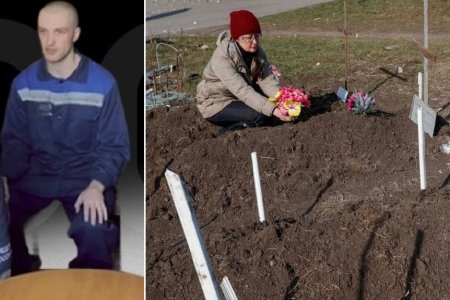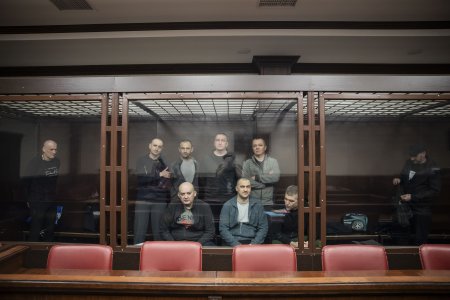
Russia’s Southern District Military Court has sentenced Andriy Serezhenko to 17 years’ maximum-security imprisonment almost three years after the Ukrainian was abducted from his native Kherson, then under Russian occupation. 42-year-old Serezhenko was accused of ‘an act of international terrorism’, which is how Russia described an attempt on the life of Yevhen Soboliev, a Ukrainian traitor, actively helping the Russian invaders and suspected by Ukraine of war crimes.
Although both Russia’s enforced disappearances and its political persecution of Ukrainians began eight years earlier, the scale increased dramatically after its full-scale invasion. According to the Memorial Support for Political Prisoners Project, the ‘case’ against Serezhenko was one of eight passed to the Southern District Military Court in June 2024. Serezhenko (b. 13.12.1982) had earlier been reported abducted from his home in Kherson on 29 June 2022.
Unlike very many ‘trials’ of Ukrainians, based solely on FSB claims that they ‘thwarted’ an allegedly planned attack, an assassination attempt did take place. Yevhen Soboliev, former head of Prison Colony No. 90, had betrayed his oath to Ukraine and begun collaborating with the Russian invaders who had made him the head of their so-called ‘penitentiary system’ for occupied Kherson oblast. Ukraine’s public prosecutor has initiated proceedings against Soboliev over his alleged role in deporting and forcibly moving over 1,700 convicted prisoners. On 18 June 2022, a homemade explosive device attached to a tree blew up near his car, causing serious injury to Soboliev’s legs.
Soboliev’s high-level collaboration with the Russian invaders made him an entirely legitimate target, and it is quite possible that Ukraine’s Military Intelligence, who reported the attack, were behind it.
It is considerably less clear that Serezhenko had anything to do with it, not least because of a propaganda video produced soon after Serezhenko’s abduction and discrepancies between this and the final indictment. Essentially every attack on Russian-installed officials leads to ‘arrests’, with there being no guarantee that ‘confessions’ shown in such videos were not obtained through torture.
On 7 July 2022, the Ukrainian publication Kavun-City reported that a notorious Russian propagandist, Ivan Litomin, had produced a video of what were claimed to be “the arrests” of two Ukrainians – Andriy Serezhenko and Oleh Pronko. Such staged ‘arrests’ of men who have long been held, incommunicado and usually tortured, have been used on many occasions since 2014. While they may not, per se, prove that the men in question did not do what the Russians accuse them of, they do arouse suspicion as to how the Ukrainians were forced to take part in the farcical performance, as well as in the ‘interrogations’.
According to the ‘confessions’ and general report, the attack on Soboliev had been “commissioned” by Ukraine’s Military Intelligence. Both Serezhenko and Pronko were supposed to have been persuaded to take part by a Kherson man called Vasyl Biblenko who was supposed to have detonated the explosive device. Since Biblenko was supposed to have, himself, been injured, and forced to “limp off on his broken leg”, it rather defies credulity that he is supposed to have been the one Ukrainian who was not caught, and who managed to get through to government-controlled Ukraine, through several Russian checkpoints. According to the version presented, Serezhenko had been supposed to take Biblenko away from the site of the explosion, while Pronko was claimed to have carried out surveillance of the traitor.
By 13 May 2025, when ‘judge’ Maksym Nikolaevich Nikitov passed sentence, only Serezhenko remained from the 2022 propaganda film. It was claimed that “in June 2022, unidentified individuals, opposing the special military operation carried out in accordance with a decision of the Russian president, recruited another individual to carry out an explosion directed against the interests of the Russian Federation. [That person] in turn involved Serezhenko in carrying out the said actions. Serezhenko was supposed to have been provided with the keys to a car in which he drove another person to a street in Kherson where the other person carried out the explosion. He then, purportedly, took the person, who had also been injured “to a safe place and provided medical assistance”.
This alleged action by a Ukrainian, living in his own city, against another Ukrainian who was collaborating with the invading state, was, most absurdly claimed to be ‘an act of international terrorism’, under Article 361 § 1 of Russia’s criminal code. Serezhenko was also charged with possession or transportation of explosives, under Article 222 § 3 of the same code. Nikitin sentenced him to 17 years’ maximum-security imprisonment, with the first two years in a prison, the worst of Russia’s penal institutions. A fine of 300 thousand roubles was also imposed.
Unfortunately, nothing is known of the actual hearings, however there were around nine or ten, which likely means that Serezhenko denied the charges, and may lodge an appeal.
Among the many aspects of Russia’s ‘trial’ on surreal ‘international terrorism’ charges that go unmentioned is the fact that the Russians seized Serezhenko from his native city which they were then illegally occupying. Kherson was liberated on 11 November 2022, with Russia ever since having bombed civilian targets in the city on an almost daily basis.



